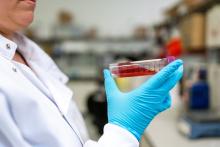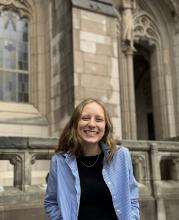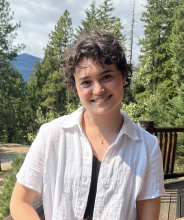The Levinson Emerging Scholars Program supports talented and highly motivated UW juniors and seniors who want to pursue creative and advanced bioscience and related research. Each year, ten outstanding UW undergraduates are named Levinson Emerging Scholars and receive funding to support their original research for 2-3 quarters, including funding to present their findings at a professional conference. Four of the ten Levinson Emerging Scholars for 2023-24 are biochemistry and chemistry students: Ella Bouker, Amber Graves, Jasleen Kaur Sidhu, and Tara Young.
Ella Bouker is a junior studying chemistry and anticipating studying molecular, cellular, and developmental biology. She joined Associate Professor Ashleigh Theberge’s Bioanalytical Chemistry for Medicine and the Environment (BCME) research group at the beginning of her freshman year. Ella has worked on two bioanalytical chemistry projects in the lab, CandyCollect: a lollipop-inspired microfluidic device designed to test for respiratory illness, and STOMP: Suspended Tissue Open Microfluidic Patterning. She is currently working on engineering and culturing new suspended tissue geometries with multiple regions to act as models for diseases with unique physiologies. With the help of the Levinson Scholars Program, Ella will develop a domed geometry with two regions to investigate if oxygen gradients form within the tissue coculture. This model will be applicable to many diseases with oxygen-gradient pathologies, including cancer. Following model development, drug screening will be conducted with the new geometry to investigate the ability of the coculture dome to act as a small-scale, ethical method for testing pharmaceuticals. Through her research, Ella hopes to develop translational models applicable to studying cancer and autoimmune diseases. She intends to continue towards a career in research post-graduation by pursuing an MD/PhD to study immunology.
Outside of the lab, Ella enjoys rock climbing, biking, running, and reading. She is also involved in the Biology 113 program as an undergraduate teaching assistant, enjoys singing in UW’s Treble Choir, and looks forward to volunteering at the UW Food Pantry this year. Ella would like to thank her mentors, Dr. Theberge and Dr. Amanda Haack, for their phenomenal support; the BCME lab for their encouragement; and her family for their love while she pursues her research. She would also like to thank the Levinson family for their generous support and the Office of Undergraduate Research for their facilitation of undergraduate research at the University of Washington.
Amber Graves is a senior majoring in biochemistry and philosophy with a minor in bioethics. She joined the research group of Professor Dustin Maly at the end of her sophomore year to work on mapping the conformational dynamics of Lck, which is a non-receptor tyrosine protein kinase involved in T cell activation. T cell activation is vital to the adaptive immune response, as it results in both the proliferation of T cells responsible for the detection of a pathogen or cancer cell, and the production of cytokines that are necessary for coordinating an immune response. Amber is interested in using chemoproteomic methods to identify regions on Lck that are differentially reactive upon T cell receptor stimulation, which would pave a route for the development of covalent ligands that stabilize Lck in its conformational extremes, directly modulating T cell activation. The modulation of T cell activation has the potential to be used in CAR T cell cancer therapies, as the use of covalent ligands that selectively stabilize Lck in its active state can act as a driver for CAR T cell activation.
After graduation, Amber hopes to pursue an MD/PhD, in which they can continue chemical biology research relating to the development of cancer therapies while also working in patient care. Outside of research, Amber is interested in learning more about various ethical frameworks and social philosophy, and how it relates to the development of current societal structure. Amber is incredibly grateful for Dr. Zachary E. Potter and Prof. Dusting J. Maly, as well as the members of the Maly Lab, for their mentorship and guidance in her research. Amber would also like to thank the Levinson family for their generosity and commitment to supporting undergraduate research.
Jasleen Kaur Sidhu is a senior majoring in biochemistry. She joined the research group of Professor Rachel Klevit (Biochemistry) in the summer of her second year where she is researching the small Heat Shock Protein HSPB5 and its disease mutant HSPB5 R120G, which is implicated in cataracts. Small Heat Shock proteins are chaperones that associate with misfolded “client” proteins to delay aggregation under stress conditions and maintain a healthy proteome. Jasleen’s current research aims to determine how the loss of arginine at residue 120 of HSPB5 affects the electrostatic properties of the protein’s structured domain and its resulting effect on HSPB5’s chaperone activity. She hopes that her research will provide insight to how mutations affect the protein’s conformation, ligand interactions and chaperone activity and be a step forward to understanding the overall chaperone mechanism of HSPB5. After graduating, Jasleen plans to attend graduate school in pursuit of a PhD in biomedical sciences. When not in school or lab, Jasleen can be found gaming the weekend away or watching shows with her roommates. She enjoys running, reading fantasy books and listening to K-pop. She is incredibly honored to be a Levison scholar and would like to thank the Levison family for their generous contribution to supporting her undergraduate research.
Tara Young is a junior interdisciplinary honors student majoring in biochemistry and minoring in bioethics. For the past two years, she has worked in the group of Assistant Professor Monica Guo (Microbiology) where she studies DNA replication proteins using biochemical and genetic techniques. One key event in DNA replication is unwinding the DNA double helix at the replication fork, which promotes the DNA strand to wrap around itself, forming knots termed “supercoils”. Resolving these supercoils is necessary for replication to continue and is performed by the essential DNA replication proteins topoisomerases. Her main project focuses on how topoisomerases are recruited to supercoils in the model system Caulobacter crescentus. By uncovering a previously unknown mechanism, Tara hopes her research could inform the development of more targeted therapies for treating disease such as bacterial infections and cancer. After graduating, she plans to attend an MD/PhD program to explore mechanisms of DNA replication, repair, and gene expression, and their role in the development of disease to ultimately improve patient care by translating this research to clinical treatments as a physician scientist.
In addition to her research, Tara enjoys working as an Undergraduate Research Leader, mentoring other undergraduates in their pursuit of research. She also serves as the president of Free Radicals, the undergraduate chemistry club associated with the Department of Chemistry. In her free time, she enjoys painting, baking, and going on walks in nature. Tara is extremely grateful for the mentorship and guidance from everyone who has supported her on her research journey, especially Dr. Monica Guo and the whole Guo Lab for providing a very positive environment to grow as both a student and researcher. She is very honored to be awarded the Levinson Emerging Scholars Award and would like to thank the generous support from the Levinson family to further her project and research career.
Congratulations to Ella, Amber, Jasleen, and Tara!
Read the original post from the Undergraduate Research Program.




